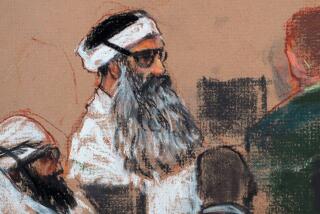Rumsfeld Vows ‘Fair and Impartial’ Anti-Terrorism Trials
- Share via
WASHINGTON — Secretary of Defense Donald H. Rumsfeld promised Thursday a “fair and impartial” system of military tribunals for those detained in the war against terrorism, but critics said the process is gravely flawed because it does not provide adequate steps for defendants to appeal convictions.
Rumsfeld formally unveiled the groundbreaking rules for tribunals, which the Pentagon calls “commissions,” but added that the plan is, for now, just a blueprint. He noted that no one has been charged and no tribunals have been formed to hear any cases.
Indeed, although 300 prisoners are being held at the U.S. naval base in Guantanamo Bay, Cuba, and hundreds more are in Central Asia, Rumsfeld could not say when--or even whether--the new policy, known as Military Commission Order No. 1, will ever be used.
“We do not have any candidates yet to be tried before commissions,” he said.
But numerous civil rights groups and other monitors said the rules fall short of protecting defendants, particularly if they cannot appeal their cases to the federal courts but must instead rely solely on the U.S. military for fairness.
“The tradition of the United States is a system of checks and balances,” said Mike Posner, executive director of the Lawyers Committee for Human Rights.
“An independent court system with judges provides a meaningful counterweight. It’s served us well. It’s one of the most fundamental cornerstones of our system, and they seem to have abandoned it.”
Commissions Won’t Be Similar to Court Trials
Rumsfeld, however, said the tribunals should not be compared to military courts-martial or U.S. court trials because so much has changed since the Sept. 11 air attacks on New York and the Pentagon.
“The commissions are intended to be different,” he said. “The president recognized that there had to be differences to deal with the unusual situation.”
He added: “Let there be no doubt. Commissions will conduct trials that are fair and impartial.”
William J. Haynes, general counsel to the Department of Defense, brushed aside criticism that the rules provide only one level of appeal: a three-member military review panel.
“Anybody that is tried will have vigorous, competent representation, and we expect that they will seek every avenue they can to protect the interests of their client,” he said.
“And we are confident that the rules will withstand any scrutiny and that we will produce a full and fair trial and a just result.”
Critics of Rules Ask for More Safeguards
But detractors pointed out that military courts-martial and the U.S. courts provide many layers of appeals. They added that, because the tribunals are a new venture, more safeguards such as appeals should be permitted.
“They raise serious separation-of-powers problems because the appellate panels are named by the president and are not judicial bodies,” said Marjorie Cohn, an associate professor at the Thomas Jefferson School of Law in San Diego.
Eugene R. Fidell, president of the National Institute of Military Justice, said, “It will trouble people who were looking for an independent appellate tier. The special review panel doesn’t have independent authority.”
On Capitol Hill, the announcement drew a generally favorable response.
Sen. Patrick J. Leahy (D-Vt.), chairman of the Senate Judiciary Committee, applauded Rumsfeld for dropping some of the early proposals for conducting the tribunals, such as holding them in secret.
And Rep. F. James Sensenbrenner Jr. (R-Wis.), chairman of the House Judiciary Committee, said the rules “reflect the best traditions of the American criminal justice system.”
The commissions will consist of from three to seven members of the U.S. military, and defendants will be presumed innocent.
The accused will be provided a military lawyer and also can hire a civilian attorney. They cannot be tried twice by a military commission for the same offense, they may refuse to testify and they can enter a plea agreement to the charges.
A Two-Thirds Vote Needed for Conviction
Commissioners need only reach a two-thirds vote for conviction, but a unanimous verdict is required in death penalty cases. All findings and sentences are final once approved by the president or the secretary of Defense.
Meanwhile, Pentagon officials have suggested for some time that most of the detainees will never be tried and instead will be sent home or held until the war is over.
“We are within our rights, and I don’t think anyone disputes it, that we may hold enemy combatants for the duration of the conflict,” Haynes said. “And the conflict is still going, and we don’t see an end in sight right now.”
More to Read
Sign up for Essential California
The most important California stories and recommendations in your inbox every morning.
You may occasionally receive promotional content from the Los Angeles Times.











